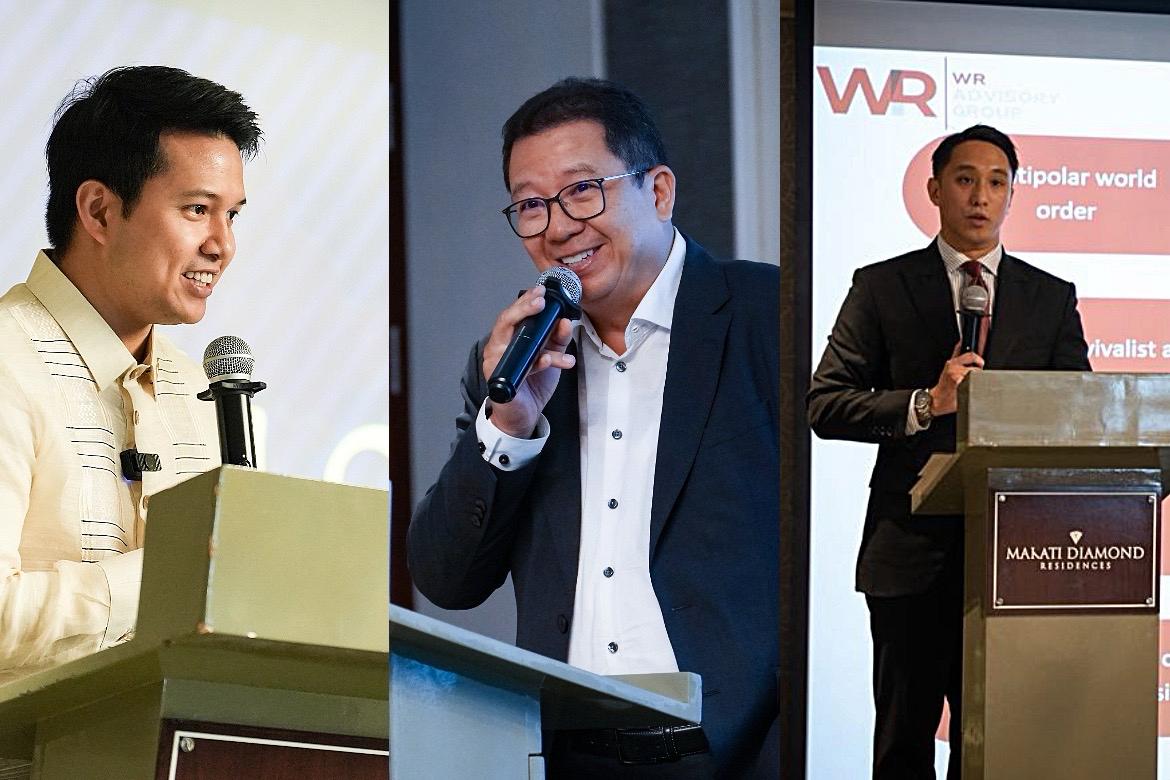Brian Poe, 2 other execs discuss economic security threats during forum

From right to left: Office of Senator Grace Poe Chief of Staff Dr. Brian Poe-Llamanzares; Ramon Garcia, chairman of DFNN; and Dr. Robin Garcia, founder and chairman of the WR Advisory Group.
MANILA, Philippines – In a panel discussion on Philippine-China relations, several experts from the national security, international affairs, and economic sectors shared valuable thoughts on “The China Challenge.”
The WR Numero hosted the panel discussion to tackle their newly found data on national security.
During the forum, Brian Poe-Llamanzares, who is a doctor of public administration currently taking a second master’s degree in National Security at the National Defense College of the Philippines, shared his thoughts on the matter.
He argued that beyond the West Philippine Sea issue, the grip China has over the Philippine economy is worrying. “Having worked for many years in the committee on public services, under Senator Grace Poe, he noticed many vulnerabilities. He cited examples of national security concerns in telecommunications, energy generation, and water related infrastructure,” Poe said.
READ: Brian Poe delivers keynote speech on digital economy in Thailand
“Outside of the WPS debate national security risks look like, compromised telecommunications, electricity generation, and water security. If we want to become independent we must find new trading partners and diversify our economic portfolio. To do this we must look beyond the United States and Japan. We must attract investment from Europe, Korea, Australia, and our ASEAN neighbors.”
Taking off from Poe-Llamanzares’s talking points, Ramon Garcia, who is the chairman of publicly listed multinational corporation DFNN, explained that from his perspective economic security and national security are inseparable especially in the context of the Philippine-China relationship. Using Singapore as his example he explained that there’s a need to view defense from a more holistic approach.
“Through Total Defense, every sector of society is mobilized and has a part to play to ensure Singapore’s security… Total Defense comprises the six pillars – Military, Civil, Economic, Social, Digital and Psychological Defense – Singapore has a vibrant economy of 6.5 million people who’s future and trade are protected by 100 fighter jets and six submarines and is one of the most capable militaries in Asia,” Garcia said.
Echoing the sentiments of his contemporaries, Dr. Robin Garcia, founder and chairman of the WR Advisory Group said, “More than ever, economics has become an issue of defense and security. This paradigm however needs greater attention in public and policy discourse. As such, there is a need to securitize economics and envision foreign direct investments (FDI’s) as a a national security issue. We cannot have a permissive economic policy with an assertive defense policy. We have to be consistent, holistic, and integrative.”
Dr. Garcia further explained that foreign direct investment is one of the many tools in China’s arsenal of non-traditional approaches towards regional control.
“The risk is that China may use economic statecraft against the Philippines, as it did with other countries. We need to have a rigorous examination of the Philippines’ level of vulnerability to China especially in public utilities and critical infrastructure such as energy or telecommunications.
A strong economy that is less vulnerable to bigger countries demands the creation of an export-oriented type of industrialized economy akin to other Asian tigers like South Korea or Japan.”
All participants in the forum were hopeful that the economic growth of the country will continue but shared similar concerns about the rising tension in the West Philippine Sea.
Other speakers present were economist Bernardo Villegas, Perry World House Senior Program Manager at the University of Pennsylvania Thomas Shattuck, and WR Numero Research President and CEO Cleve Arguelles.